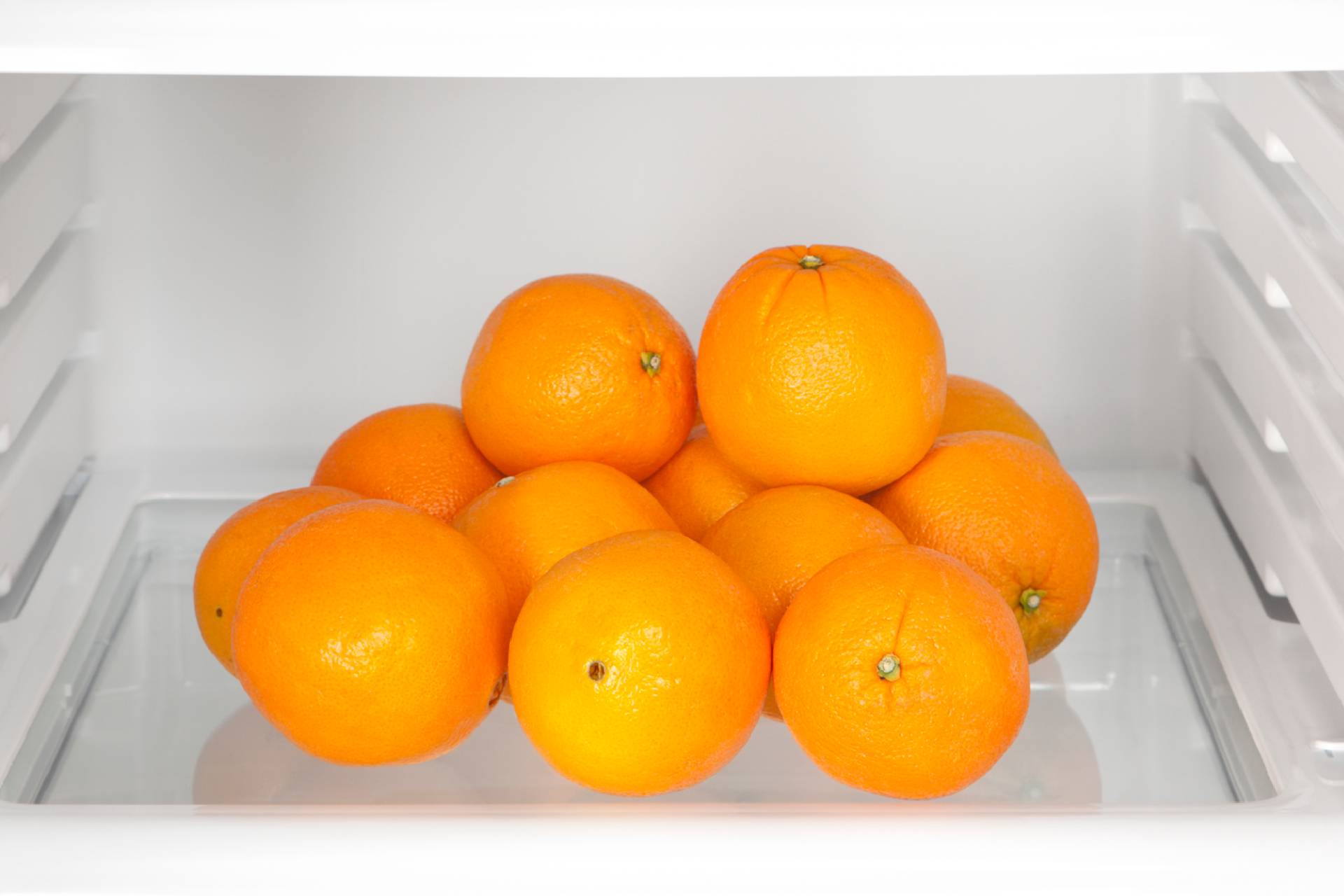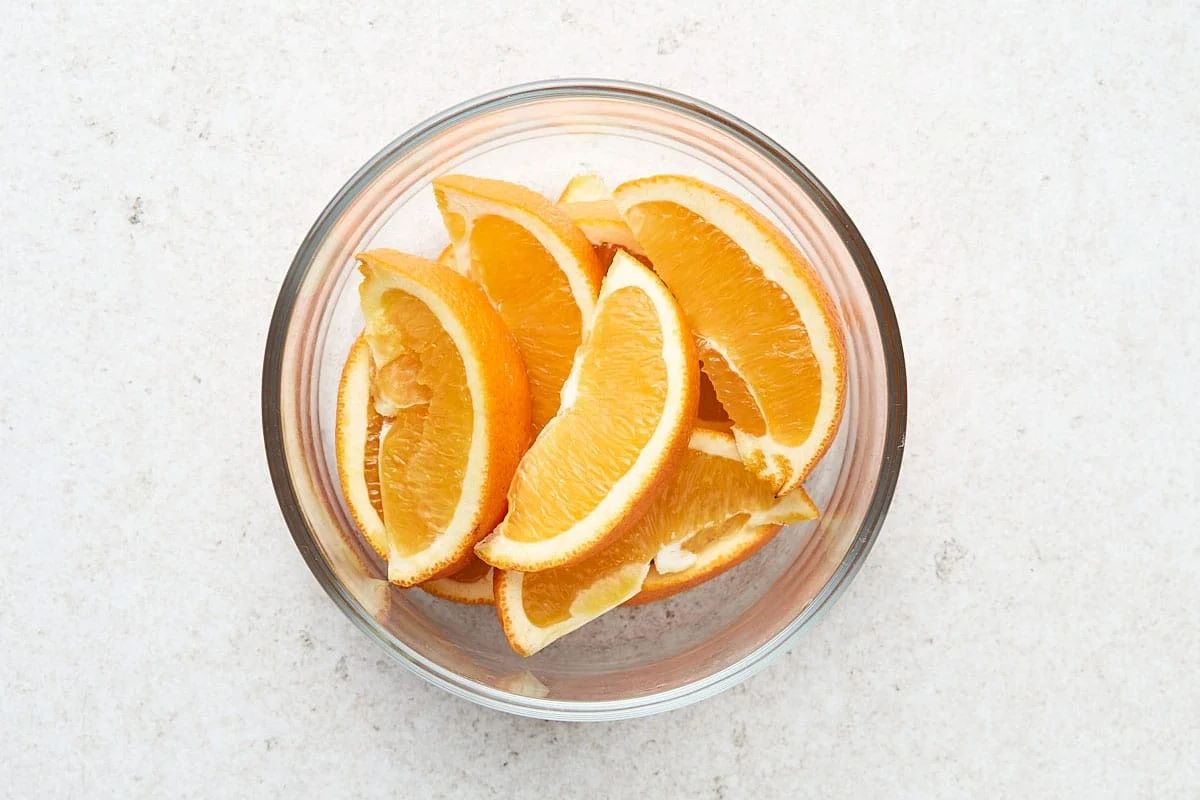

Articles
How To Store Oranges
Modified: January 19, 2024
Discover expert tips for storing oranges in this informative article. Learn how to extend the shelf life of your oranges and keep them fresh for longer.
(Many of the links in this article redirect to a specific reviewed product. Your purchase of these products through affiliate links helps to generate commission for Storables.com, at no extra cost. Learn more)
Introduction
Oranges are not only delicious but also packed with essential nutrients like vitamin C and fiber. Whether you have a surplus of ripe oranges from your garden or you simply want to stock up on this refreshing fruit, knowing how to properly store oranges is crucial to preserve their quality and maximize their longevity.
In this article, we will guide you through the process of selecting the best oranges, cleaning and drying them, and various methods to store them. Additionally, we will provide tips on freezing oranges, preserving them, storing orange juice, and preventing spoilage. By following these guidelines, you can enjoy the delightful flavor and health benefits of oranges for an extended period.
So, let’s dive into the world of oranges and learn how to store them effectively!
Key Takeaways:
- Properly storing oranges is crucial to maintain their freshness and flavor. Whether in the refrigerator, freezer, or as homemade marmalade, following the right storage methods can extend the shelf life of oranges.
- Regularly checking for signs of spoilage, using older oranges first, and storing them in appropriate conditions can help maximize the freshness and flavor of oranges. Enjoy the delightful taste of vibrant citrus throughout the year!
Read more: How To Store Peeled Oranges
Selecting Oranges
When it comes to selecting oranges, it’s important to choose ones that are ripe, juicy, and flavorful. Here are some tips to help you select the best oranges:
- Color: Look for oranges with bright, vibrant colors. Avoid oranges that have a dull or faded appearance.
- Texture: The skin of a ripe orange should be smooth and firm. Avoid oranges with wrinkled or soft spots.
- Weight: A good way to determine the juiciness of an orange is by its weight. Heavier oranges are typically juicier.
- Fragrance: Give the oranges a gentle squeeze and inhale their aroma. A fragrant orange is usually a sign of freshness and flavor.
- Size: Oranges come in various sizes, from small to large. Select oranges that feel right for your needs and preferences.
- Variety: There are different types of oranges available, such as Valencia, Navel, and Blood oranges. Each variety has its own unique taste and characteristics.
It’s worth noting that not all oranges will be perfectly ripe at the grocery store. Some varieties continue to ripen after being picked, so you can buy slightly underripe oranges and allow them to ripen on your kitchen counter. However, be mindful of the time it takes for them to ripen, as overly ripe oranges can become mushy.
Now that you know how to select the best oranges, let’s move on to the next step: cleaning and drying them.
Cleaning and Drying Oranges
Before you store oranges, it’s important to clean and dry them properly to remove any dirt, wax, or pesticide residue. Here’s how you can do it:
- Washing: Start by rinsing the oranges under cool running water. Gently rub the surface of the oranges with your hands to remove any dirt or debris.
- Using mild soap: If you prefer, you can use a mild soap to wash the oranges. Make sure to rinse them thoroughly afterward to remove any soapy residue.
- Brushing: For extra cleanliness, you can use a soft brush, like a vegetable brush or toothbrush, to scrub the surface of the oranges. This will help remove any wax or pesticide residue that may be present.
- Drying: After washing, pat the oranges dry with a clean kitchen towel or paper towels. Make sure to remove any excess moisture from the skin before storing them.
It’s important to note that while washing and drying can help remove surface dirt and residue, it won’t eliminate all pesticide residues. If you prefer organic oranges or want to minimize exposure to pesticides, consider purchasing organic or locally grown oranges.
Now that your oranges are clean and dry, let’s explore the different methods you can use to store them.
Storing Whole Oranges
Storing whole oranges is a simple and effective way to keep them fresh for a longer period. Here are some methods you can use to store whole oranges:
- Refrigerator storage: Place your oranges in the crisper drawer or a perforated plastic bag in the refrigerator. The cold temperature will help slow down the ripening process and extend their shelf life. Make sure to keep them away from strong-smelling foods as oranges can absorb odors.
- Countertop storage: If you plan to consume the oranges within a few days, you can store them at room temperature on a well-ventilated countertop. However, keep in mind that they will not stay fresh as long as refrigerated oranges.
- Paper towel wrap: Wrap each orange individually in a paper towel before storing them. This will help absorb any excess moisture and prevent them from touching each other, which can lead to mold or spoilage.
It’s important to check your stored oranges regularly and remove any that show signs of mold or spoilage. Additionally, if you notice any oranges starting to deteriorate, it’s best to use them as soon as possible to prevent the spread of spoilage to other oranges.
Now that you know how to store whole oranges, let’s move on to storing orange slices.
Storing Orange Slices
If you have sliced oranges that you’d like to store for later use, there are a few methods you can follow to keep them fresh and prevent them from drying out. Here’s how you can store orange slices:
- Refrigerator storage: Place the orange slices in an airtight container or a Ziploc bag and store them in the refrigerator. This will help maintain their freshness and prevent them from drying out. Ensure that the container or bag is sealed properly to prevent any air exposure.
- Citric acid solution: Another method to keep orange slices fresh is by soaking them in a citric acid solution. Dissolve one teaspoon of citric acid in one cup of water and soak the orange slices in the mixture for a few minutes. This will help preserve their color and texture. After soaking, drain the slices and store them in an airtight container in the refrigerator.
- Freezing: If you want to store orange slices for an extended period, freezing is a great option. Spread the orange slices in a single layer on a baking sheet lined with parchment paper. Place the baking sheet in the freezer for a few hours until the slices are frozen. Then, transfer the frozen slices to a freezer-safe bag or container. Frozen orange slices can be stored for several months.
Remember to label your containers or bags with the date of storage to keep track of their freshness. Thaw frozen orange slices in the refrigerator before using them for the best texture and flavor.
Now that you know how to store orange slices, let’s explore the option of freezing whole oranges.
Read more: How To Store Dehydrated Oranges
Freezing Oranges
Freezing oranges is a great way to preserve their freshness and enjoy their juicy goodness throughout the year. Here’s a step-by-step guide on how to freeze oranges:
- Peel the oranges: Start by removing the peel from the oranges. You can use a knife to cut away the peel, or peel them by hand. Make sure to remove all the white pith, as it can become bitter when frozen.
- Segment the oranges (optional): If you prefer, you can segment the oranges by cutting between the white membranes to separate the individual wedges. This step is optional, as you can also freeze the whole oranges without segmenting them.
- Wrap individually (optional): If you’re freezing individual orange segments, you can wrap each segment in plastic wrap or place them in freezer-safe bags or containers. This will help prevent freezer burn and make it easier to use the desired amount later.
- Place in airtight containers or bags: Whether you’re freezing whole oranges or segmented ones, ensure they are placed in airtight containers or freezer-safe bags. Remove as much air as possible before sealing to prevent freezer burn.
- Label and date: Don’t forget to label your containers or bags with the date of freezing. This will help you keep track of how long they have been frozen.
- Freeze: Place the containers or bags in the freezer and make sure they are placed in a single layer until they are frozen solid. After that, you can stack them to save space.
Frozen oranges can be kept in the freezer for up to 6 months. When you’re ready to use them, simply thaw them in the refrigerator overnight or use them directly in recipes, smoothies, or as a refreshing snack.
Now that you know how to freeze oranges, let’s explore another method to preserve their flavor and enjoy them beyond their peak season.
Preserving Oranges
If you have a surplus of oranges or want to enjoy their flavor beyond their peak season, there are several preservation methods you can try. Here are a couple of techniques to help you preserve oranges:
- Orange marmalade: One delicious way to preserve oranges is by making homemade orange marmalade. The process involves cooking the oranges with sugar to create a thick, sweet, and tangy spread. Start by slicing the oranges and removing the seeds. Then, combine the orange slices with sugar and cook them on low heat until the mixture thickens. Pour the marmalade into sterilized jars and seal them tightly. Store the jars in a cool, dark place and enjoy the delightful taste of homemade orange marmalade for months to come.
- Dried orange slices: Drying oranges is another popular preservation method. Thinly slice the oranges and remove any seeds. Arrange the slices on a wire rack or baking sheet lined with parchment paper. Place them in an oven set to a low temperature (around 200°F or 93°C) and let them dry for several hours, until they become leathery and dry to the touch. Once dried, store the slices in an airtight container or resealable bag. Dried orange slices can be used in various recipes, like teas, desserts, or as a healthy snack.
These are just a few ways to preserve oranges, but feel free to get creative and experiment with other preservation methods, such as making orange zest or candying the orange peel. Regardless of the method you choose, preserving oranges allows you to enjoy their vibrant flavor throughout the year.
Now that you have learned how to preserve oranges, let’s move on to storing orange juice.
Storing Orange Juice
Orange juice is a refreshing and nutritious beverage that can be enjoyed any time of the day. If you have freshly squeezed orange juice or store-bought orange juice that you want to store for later use, here are some guidelines to follow:
- Refrigerator storage: If you plan to consume the orange juice within a few days, you can store it in the refrigerator. Transfer the juice to a clean, airtight container or keep it in its original container, tightly sealed. The cold temperature of the refrigerator will help slow down the degradation process of the juice.
- Freezing: To extend the shelf life of orange juice, you can freeze it. Pour the juice into freezer-safe containers, leaving some headspace for expansion. Seal the containers tightly and label them with the date. Frozen orange juice can be stored for several months. When you’re ready to use it, thaw the juice in the refrigerator or under cold running water.
- Ice cube trays: Another option is to freeze orange juice in ice cube trays. This method is useful if you only need small portions of juice at a time. Pour the juice into the ice cube trays and freeze until solid. Once frozen, transfer the orange juice cubes to a freezer bag or container and store them in the freezer. These juice cubes can be used to flavor water, make smoothies, or add to recipes as needed.
It’s important to note that while frozen orange juice is safe to consume after thawing, the texture may slightly change. The juice might separate or become slightly pulpy. Give it a good shake or stir before serving to redistribute the pulp and improve the texture.
Now that you know how to store orange juice, let’s move on to some tips for preventing spoilage.
Store oranges in a cool, well-ventilated area away from direct sunlight. They can also be stored in the refrigerator, but be sure to let them come to room temperature before eating for the best flavor.
Preventing Spoilage
To ensure the longevity and quality of your stored oranges, it’s important to take certain precautions to prevent spoilage. Here are some tips to help you prevent oranges from spoiling:
- Inspect before storage: Before storing oranges, carefully inspect each one for any signs of mold, soft spots, or damage. Remove any damaged oranges from the batch as they can cause the surrounding ones to spoil faster.
- Separate spoiled oranges: If you have stored oranges together and one of them starts to spoil, it’s crucial to separate it from the others immediately. This will prevent the spread of mold or spoilage to the rest of the oranges.
- Avoid overcrowding: Whether you’re storing whole oranges or orange slices, it’s important not to overcrowd them. Overcrowding can lead to increased moisture and decreased airflow, which can accelerate spoilage. Allow some space around each orange to promote air circulation.
- Regularly check for freshness: Periodically check your stored oranges for freshness by examining their appearance and giving them a gentle squeeze. Discard any oranges that show signs of mold, excessive softness, or an off-putting odor.
- Rotate stock: If you have a large quantity of oranges, it’s a good practice to rotate your stock. Use the older oranges first to ensure none go to waste and maintain a fresh supply.
- Store at the right temperature: Oranges should be stored in a cool, dry place or in the refrigerator, depending on how quickly you plan to consume them. Avoid storing oranges in areas with high humidity, as moisture can promote mold growth.
By following these guidelines, you can significantly reduce the chances of spoiled oranges and maximize their freshness and flavor.
Now that you have gained insights on preventing spoilage, let’s move on to some frequently asked questions (FAQs) about storing oranges.
Read more: How To Store Cuties Oranges
Frequently Asked Questions (FAQs)
1. How long do oranges last when stored properly?
When stored properly, whole oranges can last up to two weeks in the refrigerator. However, the exact shelf life can vary depending on factors such as the initial freshness of the oranges and the storage conditions.
2. Can I store oranges at room temperature?
While it’s generally recommended to store oranges in the refrigerator for optimum freshness, you can store them at room temperature for a few days if you plan to consume them soon. Just make sure to choose a cool and well-ventilated area away from direct sunlight.
3. Can I store oranges together with other fruits?
It is best to avoid storing oranges together with certain fruits like apples, bananas, and other ethylene-producing fruits. This is because ethylene, a natural gas produced by some fruits, can accelerate the ripening process and spoilage of oranges. If you do need to store them together, make sure to monitor them closely for any signs of spoilage.
Read more: How To Store Orange Slices
4. Can I store cut oranges?
If you have cut oranges, it’s best to consume them as soon as possible for the freshest taste and maximum nutritional benefits. However, you can store cut oranges in an airtight container in the refrigerator for up to three days.
5. Can I store citrus fruits together with oranges?
Yes, you can store other citrus fruits like lemons, limes, and grapefruits together with oranges without any issues. They have similar storage requirements and can be stored together without affecting each other’s freshness.
These FAQs should provide answers to some common questions about storing oranges. If you have any more specific queries, feel free to reach out for further assistance.
Now, let’s wrap up this article.
Conclusion
Knowing how to store oranges properly is essential to maintain their freshness, flavor, and nutritional value. Whether you have a surplus of homegrown oranges or want to stock up on this versatile fruit, following the right storage methods can help extend their shelf life and prevent spoilage.
In this article, we covered various aspects of storing oranges, including selecting the best oranges, cleaning and drying them, storing whole oranges and orange slices, freezing oranges for long-term storage, and preserving oranges in different forms. We also provided tips for storing orange juice and preventing spoilage.
By following these guidelines, you can ensure that your oranges stay fresh and delicious for an extended period. Whether you prefer enjoying whole oranges, sliced oranges, homemade orange marmalade, or dried orange slices, you now have the knowledge to store them properly and savor their flavor whenever you desire.
Remember to regularly check your stored oranges for signs of spoilage, use older oranges first, and store them in the appropriate conditions. By doing so, you can reap the benefits of this nutritious fruit and enjoy the taste of vibrant citrus throughout the year.
So go ahead and apply these storage techniques to your oranges to make the most out of this delicious fruit!
Thank you for reading, and happy orange storing!
Frequently Asked Questions about How To Store Oranges
Was this page helpful?
At Storables.com, we guarantee accurate and reliable information. Our content, validated by Expert Board Contributors, is crafted following stringent Editorial Policies. We're committed to providing you with well-researched, expert-backed insights for all your informational needs.













0 thoughts on “How To Store Oranges”